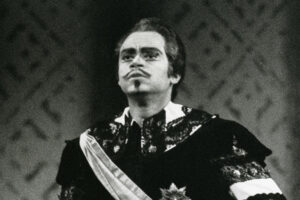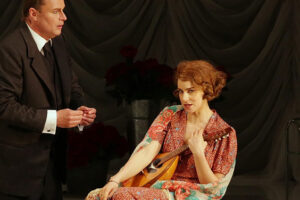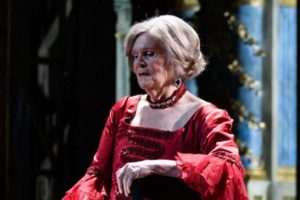

I mean, think about it. Mimì and Rodolfo meet. They banter with the key and the candle for about five minutes. Then it goes like this:
“Che gelida manina” = Hi, I’m Rodolfo. I’m poor, but I’m nice.
“Si, mi chiamano Mimì” = Hi, I’m Mimì. I’m also, poor, and also nice.
“O soave fanciulla” = Let’s bang!
Most of the time singers and directors are just content to let Puccini’s music do the explaining. And Franco Zeffirelli’s production of La bohème is such a staple at the Met that year in, year out, singers enter and leave the garret and it’s up to them to create the mood.
And sometimes they really don’t bother. In the last Bohème in January I saw Joseph Calleja (in glorious voice) and Majia Kovalevska (in not so glorious voice) sat absentmindedly on opposite sides of the table, twiddling their thumbs as they waited for their turn to sing. It’s a rare thing to see singers who actually take the time to explain to the audience how and why Mimì and Rodolfo fall in love.
Vittorio Grigolo from the start was an unusually boyish, playful Rodolfo. In his tight scarf and fitted vest he was also hipster cool. The banter between him, Marcello (Massimi Cavalletti), Colline (Nicolas Testé), and Schaunard (Patrick Carfizzi) was genuinely fun and funny. But when Mimì knocked on the door, Grigolo all of sudden primped himself in the mirror, an endearingly insecure thing guys do when they’re nervous.
The Mimì (Anita Hartig, in her Met debut) wasn’t overtly kittenish or flirty—she was genuinely sick. She collapsed on the table immediately, and as Rodoldo ran to her side, they touched each other gingerly. Both “Che gelida manina” and “Si mi chiamano Mimì” were sung almost conversationally, with the occasional pause that people take when talking about themselves. They were shy and hesitant. But an adoring gaze here, an upward glance there, and you completely believed.
It helps that both Grigolo and Hartig have voices that, while beautiful and vibrant, are not large and rafter-raising. Thus it seemed as if they were singing to each other, rather to a 4,000 person auditorium. Grigolo took “Che gelida manina” in key, and it took a split second for his high C to get there, and his phrasing was so sensitive, his acting so believable, that I didn’t miss the extra decibels.
Hartig has a soft-grained soprano, with a quick vibrato. Her approach to the music reminds me in a way of her compatriot Angela Gheorghiu—as I said, she doesn’t push, she’s content to sound almost whispery, and she also lets her voice taper off at times, just like Gheorghiu.
But she knows when to let her voice bloom, as during the phrase “Ma quanto vein lo sgielo.” The gradual crescendo as Mimì spoke of the spring was absolutely captivating. Grigolo leaned forward to listen, and so did the audience. By “O soave fanciulla” one had totally forgotten that Mimì and Rodolfo just met 10 minutes ago, and when they kissed by the garret door, it was a fitting end to a beautifully played scene. (And for those who care, Grigolo took the high C along with Hartig in the final “Amor.”)
The second act of Zeffirelli’s Bohème is always a crowd pleaser, but today I found it so garish and busy, especially after the sweet romanticism of Act One. Jennifer Rowley (another debut) has the right Musetta voice though—bright and silvery. It was a contrast with the earlier Musetta I saw this season, Irina Lungu, whose voice sounded way too dark and creamy for the role. And Rowley really acted the part too with an endearing brassiness. “Quando m’en vo” had the winning mix of agility, vivaciousness, and sensuality.
It was the third and fourth acts however that made this Bohème the most touching I’ve ever seen (and I’ve seen quite a few). There was no awkward side hugging, air kissing, and other stage tricks between this Mimì and Rodolfo. Their body language was heart-rending, as was their singing. Both Grigolo and Hartig have that special quality of singing every phrase like they mean it and believe in it.
The highlights were Mimì and Rodolfo’s consecutive duets with Marcello in Act Three. Both Hartig and Grigolo poured out their heart and soul, and to see such lovable people in pain… Well, isn’t that the whole appeal of Bohème? It sounds so easy, but it’s so rarely achieved.
Hartig’s death scene was also masterful. During “Sono andati” she attempted to rise, and promptly fell back into Grigolo’s arms, and there were sniffles all over the house. It helped that the group of friends that rallies around Mimì and Rudolf truly seemed like a group of friends. When Colline sang “Vecchia zimarra” to his coat, there was, as I said, no hint of the rote or routine. Testé, by the way, was making his debut as well, and has a rich, plummy bass baritone.
The conductor, Stefano Ranzani, took the leisurely approach, which was probably wise given both Grigolo and Hartig’s occasionally halting, idiosyncratic phrasing. I thought the second act crowd scene could have had more bounce, and he could have pushed the singers a little harder, to give the score more pulse and urgency in the big climaxes.
Grigolo was such a sensitive, ardent, likable Rodolfo that it was a bit of shock to experience his curtain calls. They really have to be seen to be believed, but I’ll try to describe the four step process:
- He dramatically snaps his arms wide open, as a magician would do while opening his cape.
- He swiftly falls to the floor on bended knee, as if he were about to propose.
- He gives himself a tight embrace. As the applause swells, he’s too overwhelmed to look at the audience, but instead hugs himself tighter. He holds onto himself for dear life.
- He dramatically snaps his arms open again, springs to his feet, and sweeps offstage.
But who cares? He’s such a generous artist, he deserves a hug.
Photo: Marty Sohl/Metropolitan Opera
























Comments